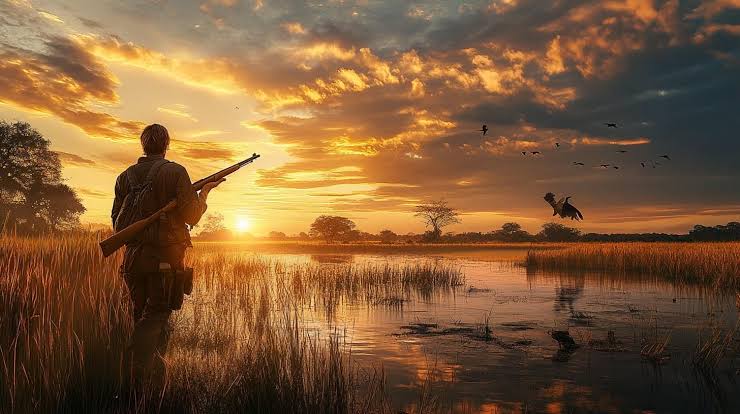Blog
The Thrill and Responsibility of Big Game Hunting

For centuries, hunting has been more than just a way to procure food—it has been deeply woven into human culture, tradition, and survival. Among the different types of hunting, Big game hunting stands out as one of the most challenging and exhilarating outdoor pursuits. It requires not only skill and patience but also a deep respect for wildlife and nature.
What is Big Game Hunting?
Big game hunting refers to the pursuit of large animals such as deer, elk, moose, bears, mountain lions, and other similarly sized creatures. In various parts of the world, this can also include species like African buffalo, elephants, and antelope. For many hunters, the challenge lies not just in the size of the animal but in tracking, stalking, and harvesting game in some of the most remote and rugged environments on Earth.
Unlike small game hunting, where animals like rabbits or birds are targeted, big game hunting demands a higher level of preparation, physical endurance, and knowledge of the animal’s behavior and habitat.
The Role of Conservation in Big Game Hunting
One of the most misunderstood aspects of big game hunting is its relationship with wildlife conservation. When regulated and conducted responsibly, big game hunting can actually play a vital role in preserving ecosystems and protecting animal populations.
In many countries, hunting licenses and permits contribute significantly to wildlife management programs. These funds support habitat restoration, anti-poaching efforts, and scientific research. Additionally, strict quotas and seasonal restrictions ensure that hunting does not threaten species survival but helps maintain a healthy ecological balance.
Moreover, ethical hunters often work closely with conservation organizations to ensure that hunting practices align with sustainable wildlife management goals.
Preparation and Skills Required
Big game hunting is not a pursuit one can take lightly. It demands thorough preparation, both physically and mentally. Here are some essential aspects to consider:
1. Physical Fitness: Hunting large game often requires trekking through rough terrain, sometimes at high altitudes or in extreme weather conditions. Being in good physical shape is crucial to withstand the demands of the hunt.
2. Understanding Animal Behavior: Successful hunters invest time in studying their target species—their feeding habits, movement patterns, and preferred habitats. This knowledge improves the chances of a successful hunt while reducing the risk of unnecessary suffering for the animal.
3. Marksmanship and Equipment: Accurate shooting is essential to ensure a humane harvest. Hunters must regularly practice with their firearm or bow and be familiar with their equipment. Choosing the right caliber or arrow setup for the specific game is equally important.
4. Survival Skills: In remote areas, being prepared for emergencies is vital. Hunters often carry first-aid kits, navigation tools, and survival gear to handle unexpected situations.
Ethical Considerations
Ethical hunting is the foundation of responsible big game hunting. It means following all legal regulations, respecting wildlife, and ensuring that the animal is harvested humanely. It also involves fair chase principles—meaning that the animal has a reasonable chance to escape, and modern technology does not unfairly tilt the odds in favor of the hunter.
Respect for the land is also critical. Hunters must avoid damaging habitats, littering, or causing unnecessary disturbances to the ecosystem. Responsible hunters often advocate for preserving wilderness areas and support efforts to protect endangered species.
The Rewards Beyond the Hunt
For many enthusiasts, big game hunting is not solely about harvesting an animal. It is about the entire experience—the connection with nature, the patience of tracking, the adrenaline of the chase, and the sense of accomplishment that comes from overcoming challenges. Often, hunters describe the quiet moments in the wilderness, observing wildlife, and testing their skills as the most rewarding aspects.
Additionally, harvested animals often provide sustainable, organic meat, which many families use as a primary food source. Nothing goes to waste when hunting is conducted with respect and responsibility.
Final Thoughts
Big game hunting is an activity that combines tradition, challenge, and a deep appreciation for the natural world. When practiced ethically and sustainably, it can contribute to wildlife conservation and provide unforgettable experiences in some of the planet’s most breathtaking environments. For those willing to commit the time, energy, and respect required, big game hunting offers both adventure and responsibility in equal measure.
Blog
When Guilt Becomes The Shadow You Carry Until You Learn To Forgive Yourself

Guilt is quiet. It doesn’t shout; it lingers. In Under the Current, Jared Siler doesn’t write about the kind of guilt that fades after an apology. He writes about the one that stays, the guilt that hides under smiles, routines, and unspoken words. His story moves through that shadowed space where people convince themselves they’ve moved on while their hearts still replay the same moment. It’s haunting because it’s real. Every page feels like a mirror to the parts of yourself you’d rather not meet.
The Past Has A Way Of Whispering When The World Is Silent
Siler’s writing captures how memory never fully disappears. The past waits patiently for the quiet, and then it returns, softly, relentlessly. The character in Under the Current finds that even small triggers bring old feelings rushing back. There’s no escape in distraction, only delay. Through his words, Siler reminds readers that healing doesn’t come from pretending. It comes from facing what the silence brings.
Shame Grows In The Spaces Where Truth Is Avoided
One of Siler’s strongest insights is how easily guilt turns into shame when left unspoken. What begins as regret slowly becomes identity. The character stops seeing himself as someone who made mistakes and starts believing he is the mistake. That quiet shift becomes the emotional center of the story. Siler never lectures. He shows the slow corrosion of hiding, the way shame can convince even strong people to live half-alive.
Forgiveness Does Not Mean Forgetting What Happened
When the character begins to face his guilt, it doesn’t arrive with relief; it arrives with trembling honesty. Siler doesn’t make forgiveness look easy or instant. Instead, he describes it as a decision made again and again, one breath at a time. To forgive yourself, he suggests, isn’t to erase the past but to stop letting it decide who you are. That understanding becomes the quiet heartbeat of the book.
The Current Pulls You Toward The Truth You Keep Avoiding
There’s a reason Siler chose Under the Current as his title. The “current” isn’t just water, it’s conscience, memory, emotion. It’s what moves beneath every calm surface. The character tries to swim against it, to outpace the reminders of guilt, but eventually he understands that the only way forward is through. That moment, when resistance turns into surrender, is written with rare honesty. It’s where the story stops being just fiction and starts feeling like a confession we’ve all made silently.
Freedom Begins When You Admit You’re Still Learning To Heal
part of the story. The character’s transformation isn’t dramatic. It’s slow, raw, and deeply human. He learns that healing isn’t a clean process; it’s a return to truth. The current doesn’t erase his past; it teaches him how to live with it. That realization gives the book its depth and its calm power.
Honesty Becomes The Bridge Between Regret And Redemption
One of the most beautiful threads in Siler’s writing is how he uses honesty as redemption. There’s a turning point when the character finally stops performing strength and begins speaking truth, to himself and to others. It’s not easy. The words stumble, the walls resist, but once honesty begins, peace follows. Siler doesn’t write this as a grand revelation but as a quiet rediscovery. Sometimes the smallest truths are the ones that save you.
The End Feels Like A Beginning You Didn’t Expect To Find
By the final pages, guilt hasn’t vanished, but it’s no longer the main character. Acceptance takes its place. Siler closes the story not with resolution but with release. The reader feels a calm ache, the kind that comes when you realize forgiveness is not about perfection, it’s about permission. The permission to start again, to love again, to be flawed and still worthy of peace. Under the Current leaves you with that quiet courage, the belief that even after mistakes, you can still find your way back to yourself.
Blog
Master the Art of Predicting Tennis Scores with These Proven Tips and Techniques

As an avid tennis fan, you must be eager to predict what the game will be like in future. Perhaps you are doing this for fun, or perhaps you want to increase your knowledge, and at the same time, supplement your income. Whichever the case, you might become an expert at forecasting tennis scores with a few expert tactics, regardless of your level of experience.
With that in mind, let us check out some of the tips and techniques to help you in predicting tennis scores without a hassle.
Examine the Player’s Performance and Form at the Moment
The first place to look for accurate tennis score predictions is the players’ recent performance. Recent performance is often a reliable indicator of how a player will perform in their upcoming game. For instance, have they recently been winning or losing?
How have they fared in comparison to opponents with higher rankings? You can obtain important information by looking into their win-loss record and track record of consistency.
Consider Surface and Conditions
Conditions and surfaces are crucial factors to look at while predicting tennis scores. Tennis is played on hard courts, grass, and clay surfaces. The way the game is played varies depending on the type of surface, and participants frequently have preferred options.
For example, some players excel on clay but struggle on grass, or the other way around. When attempting to forecast tennis scores, consider the players’ respective performance on each surface. For instance, Roger Federer performs well on grass, and Rafael Nadal excels on clay courts.
Remember the match circumstances as well. Is it outside or inside that the game is being played? Is it hot, muggy, or windy? These elements may have an impact on a player’s performance and overall score.
Employ Statistical Instruments
Sports analytics provides a plethora of websites and tools that provide real-time updates, winning percentages, and comprehensive player statistics. These sites can be used to forecast outcomes based on information.
The Sports Prophets can help you improve your prediction because they track specific statistics like break points saved, first-serve percentages, and victory rates on various surfaces.
Head-to-Head Matchups Matter
Analyzing players’ prior results against one another is a helpful method of forecasting tennis scores. Even against players that are ranked higher, some players find it difficult to defeat them. Examine their previous games to look for any trends.
Does one player typically have an easy win, or do their matches tend to be quite close? You can determine if the match will be competitive or one-sided based on this historical data.
Think about Player Fatigue and Injuries
Fatigue and injury can have an impact even on the best players. Find out if a player is recovering from an injury or has played a lot of matches lately before predicting tennis scores. A fatigued player may not give their utmost effort, which could produce unexpected outcomes.
Analyze Playing Techniques
Tennis is a mental game as much as it is a physical one. The way that players perform has a major impact on how a match turns out. While some players use technique and smart movement to control the game, others are aggressive and hit hard from the baseline.
Comprehending the interplay between several styles can aid in forecasting the outcomes of games. You might anticipate lengthier rallies and more opportunities for tiebreaks, for instance, if a player with a reputation for making big shots is facing a defensive player who excels at returning balls.
Conclusion
Predicting tennis scores requires you to be well-informed, and to have the right intuition and analysis. The above tips and advice from experts are just what you need to navigate this field without a hassle. We hope that our guide has cleared up all of your doubts and errors when it comes to predicting tennis scores.
Blog
Compelling Reasons for the Switch to Eco-Friendly Tote Bags

Tote bags are a sort of bag that can be used by either gender. Their adaptability makes them one of the most effective marketing tools for companies. They are made from a variety of materials, each with unique properties and appealing attributes. But in this day and age, there is a need to move away from certain materials and toward eco-friendly alternatives. The relevant arguments for selecting eco-friendly tote bags over other options will be discussed in this article.
1. Decreased Plastic Waste with Eco-Friendly Tote Bags
Plastic is one of the materials used to make some bags. Plastic garbage pollutes the environment, endangers wildlife, releases chemicals into the air, has a detrimental effect on human health, and upsets ecosystems. Introducing eco friendly tote bags is one way to address the problems related to plastic waste from other bags. Eco-friendly tote bags are meant to take the place of single-use plastic bags. By doing this, trash is decreased, and the impacts of plastic waste are reduced.
2. A Reduction in Carbon Footprint
The notable reduction in carbon footprint associated with the use of eco-friendly materials in tote bag production is one of the main drivers of this shift. Reduced carbon emissions result from the energy efficiency and sustainability of the environmentally friendly materials’ production process. Accordingly, the impact of production is minimized, and greenhouse gas emissions are decreased. This creates a cost-effective choice without compromising the environment’s health.
3. Preservation of Natural Resources
Plastic products are discarded regularly, resulting in the consumption of additional resources. But the introduction of eco-friendly materials closes this gap. These recyclable and biodegradable materials help to preserve natural resources.
Furthermore, compared to non-renewable resources like fossil fuels, renewable resources, which are utilized to create some eco-friendly tote bags, may be used sustainably. Additionally, this helps to preserve the environment’s resources. Through the development of the circular economy and the encouragement of sustainable industries, it also promotes sustainable behavior.
4. The Durability and Reusability of Eco-Friendly Tote Bags
The important environmental and financial benefits of switching to eco-friendly tote bags are largely attributed to their durability and reusability. Long-term reusability of the materials is facilitated by factors such as their high quality, reinforced stitching, ergonomic design, quality control, and design elements. Furthermore, they are more resilient due to their resistance to water and tearing. Their convenience of use is enhanced by these two qualities. This also makes them simple to maintain and clean.
5. Consumer Awareness and Responsibility
Switching to eco-friendly tote bags is also important because it shows a dedication to environmental stewardship and increases consumer understanding of sustainable practices. By using them for marketing purposes, businesses are consciously choosing to reduce the amount of plastic garbage they produce and the related environmental issues like pollution and habitat damage. This is a strategic tactic used by brands to attract environmentally conscientious customers.
Conclusion
The public appeal of eco-friendly materials is one of the reasons to choose them for tote bag production. Businesses are taking advantage of this to their marketing benefit due to the positive impact on the environment and efficient cost management.





